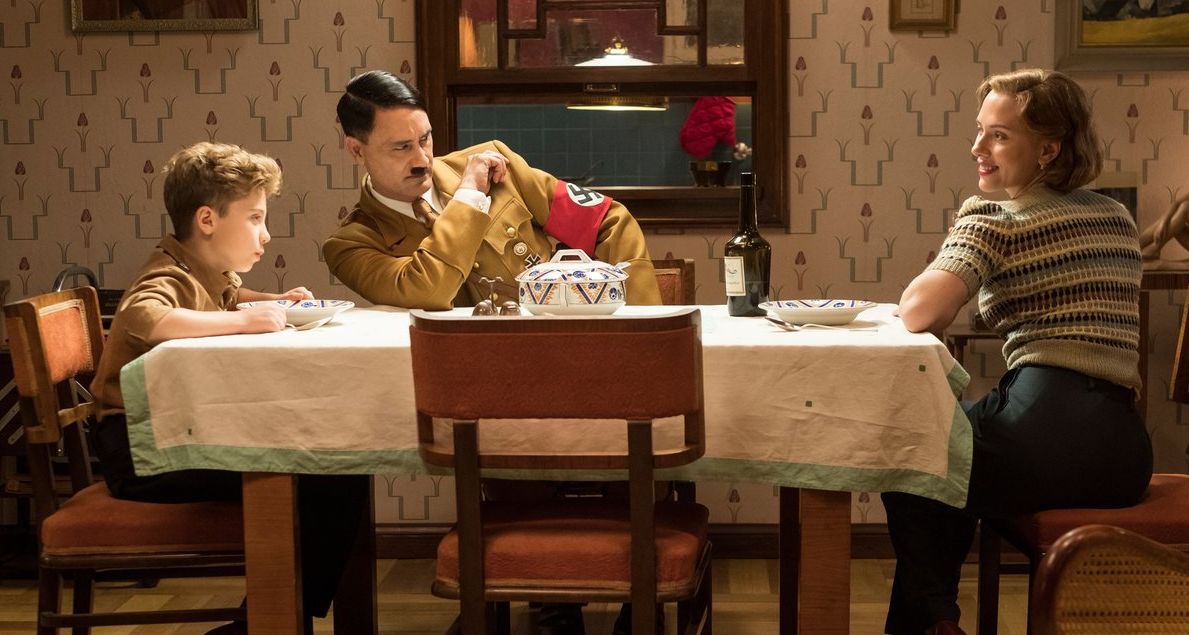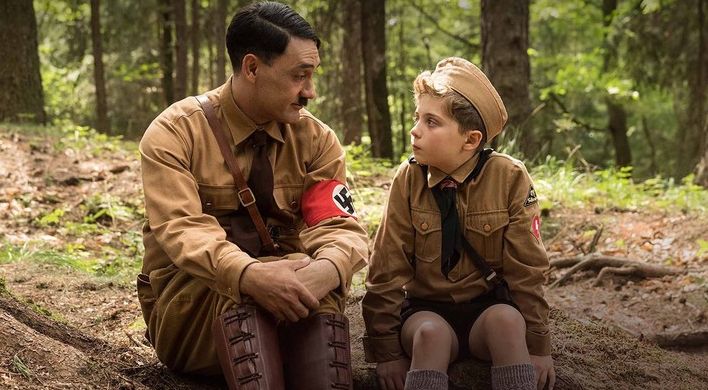
‘Jojo Rabbit’ Review
Jojo Rabbit is a sensational masterpiece converging comedy with sobering sincerity to produce a story that criticizes anti-Semitism, cutting deep into audiences' consciences and stirring their spirits. Note this review shall encompass spoilers among other examinations.
Young Jojo is the result of a boiling milieu seasoned with shameless propaganda. A ten-year-old boy growing up in Nazi Germany, he has wholeheartedly embraced the ideals of Adolf Hitler's regime and everything that the Führer's cronies have fed to the nation's youth.
While Jojo's dad is out of the picture, it is only natural that the boy concocts an imaginary companion who functions as somewhat of a father figure. This make-believe paternal icon is none other than Jojo's idol, the head of the Third Reich, who is played by Waititi himself.
Cinematic marksmanship is not the most admirable quality of this film, unlike the importance of such artistry in Sam Mendes' fabulous 1917. Rather the focus of this movie is on its storytelling, an aspect which is not given due attention and passion in many modern productions. Jojo Rabbit is marked by its felicities of emotion, relationship-building, and reversal of brutally unjust ideologies. It presents a very fine-tuned narrative, with stellar performances from the majority of its cast, in an exploration of belonging and a search for truth.
Waititi is no stranger to the comedic landscape in both his acting and directing. The Thor: Ragnorak director put his talents to the test and struck gold with this one. He weaves a scathing but liberating tale and, additionally, makes an amusing caricature out of Adolf.
Scarlett Johansson provided perhaps the most evocative, multidimensional character portrayal, while those of Roman Griffin Davis as Jojo and Thomasin McKenzie as Elsa were nearly just as potent. Joining Waititi and others for the comedic kicks, was actress Rebel Wilson. Well-known for her chick flicks and comedies, Wilson here plays Fraulein Rahm, who assists in the education and strategic training of the youth.
In the film, the members of every Nazi faction are depicted as foolhardy, ignorant, and brash – being painted in a distinctive manner to show the folly of their ways. The Nazis make clowns of themselves, and their swastikas are their ghoulish makeup, the war paint of slaughterers. Sam Rockwell's Captain Klenzendorf – heck, he was practically dressed as a circus clown for the final battle sequence.
Here the Nazis serve as both daunting antagonists as well as bumbling, unproductive idiots offering comic relief. In Jojo Rabbit, their depiction receives similar treatment as the Nazis of Stalag 13 in Hogan's Heroes, namely: laughable embarrassment.
Following Jojo across a span of months, we see his entire worldview (and his very world) undergoing changes and challenges. In addition to the absence of his dad, Jojo finds himself in a rather secluded existence. He shares in the outdoor childhood adventures of his peers but finds it hard to make friends. Thus, he tries to fill this void by dedicating his energies to the Nazi regime.
Furthermore, the sense of abandonment and loneliness Jojo experiences makes each relationship he has a cherished one. Even Elsa, the Jewish girl hiding in his late sister's bedroom, starts to work her way into the boy's affections. At the same time, his attachment to the bonds he has with family and friends make their loss yet more painful.
When Rosie, Jojo's comforting mother, is discovered to be dead, the audience mourns along with the ten-year-old protagonist. Devastated, his relationship with Elsa briefly reverts to its hostile origins as Jojo blames her for his mother's death. In a world of pain and disappointment, Jojo must learn to cope with further tragedy.
The relationship between Elsa and Jojo is more often than not distraught with turbulence, at the core of which is a social struggle between Aryan supremacy and the dignity of the human person. From the very start, the source of Jojo's distrust in Elsa stems from her Jewish identity. A terrific scene comes up when the Nazi youth starts lecturing the girl about his superiority by right of birth, how the noble Aryan blood runs through his veins. Suddenly, Elsa gets physically abrasive and retorts: “I am descended from those who wrestle angels and kill giants!”
The heated moment fading into memory, the two begin to get better acquainted. They learn about each other, and they learn from one another. It is essentially his relationship with Elsa, along with the example of his mother, that inevitably leads to a conversion within Jojo.
In Between Man and Man, the Jewish philosopher Martin Buber warns of a dangerous and constrictive metaphorical armor. He explains, “Each of us is encased in an armour which we soon, out of familiarity, no longer notice. There are only moments which penetrate it and stir the soul to sensibility.”
Buber is noting that this symbolic armor bars discourse between different people. The promptings of the ego and the habitual practice of supremacy set up a barrier against fair, open conversation. But in the relationship between this Aryan boy and Jewish girl, a message of humanity does penetrate Jojo's hardened armor of presupposition. He begins to see Elsa as a fellow human being. He begins to nurture for her that feeling which all people of all races can relate to: love.
Another touching scene comes at the expense of Captain K, the Nazi official who decided not to turn Elsa in to the authorities. Jojo finds him awaiting execution by the Allies' firing squad, where Jojo is likewise placed on death's row. After a word of consolation to the youth, Captain K shoves the kid away from him, yelling that he is a Jew. One of the victorious soldiers confronts the captain to break up the brawl and then tells Jojo to leave the execution zone. That is the last he saw of the courageous Captain K – a man who, despite his flaws, had a heart inside of him.
Before the climactic battle sequence, Jojo bumps into his old comrade Yorki, who informs him that Hitler recently committed suicide. This is a terrible blow to Jojo. Following the wrap-up of that final skirmish, he returns home, where Elsa is hiding. He has lost everything and everyone. His morale is shattered. His mother, his Führer, and his friend Captain Klenzendorf: all are gone.
There is but one thing left unsettled that Jojo must sort out. Hitler can't just die vaguely in a bunker miles away; Jojo must eradicate Hitler's essence which continually haunts his mind and twists his conscience. In the crescendo of the protagonist's character arc, the boy confronts Waititi's Hitler, who is now portrayed with a bloody hole in the side of his skull, and renounces him.
Jojo becomes free of the worries of war and of slavery to Hitler's philosophy, while Elsa discovers the joy in regaining the right to live and breathe freely. Both receive liberation at the Allies' victory. It ends with the two of them dancing, celebrating triumphantly as King David might have done in the presence of the Ark.
Standing in comparison to such films as Schindler's List or The Book Thief, Jojo Rabbit similarly offers a somber illustration of the anti-Semitism of World War II but with the added ingredient of humor to counteract the severity of the subject matter.
Jojo Rabbit is a satirical drama that delivers a jolt along with a jeer. It makes you uncomfortable. It makes you remember the good and the bad, the cold truths and the fairy tales of childish imagining. A tear, a smile, a budding love: all these are painted into the frame and into the very hearts of the onlookers.
By the end of the film, Jojo is not just another blind follower. He rises above the Nazis, these spiritual infants touting their supremacy. The ten-year-old surpasses his elders in wisdom, in authentic maturity. His is the curious mind and the wounded heart.
The film has certainly deserved an Oscar for Best Adapted Screenplay, the Critics' Choice Movie Award for Best Young Performer, and the handful of other awards which it has received. More than that, it is a film worth your time. Through the comedy and the harsh reality, through the crass remarks and the scoffing, its message remains intact, and it's a message that is pertinent to our day.

